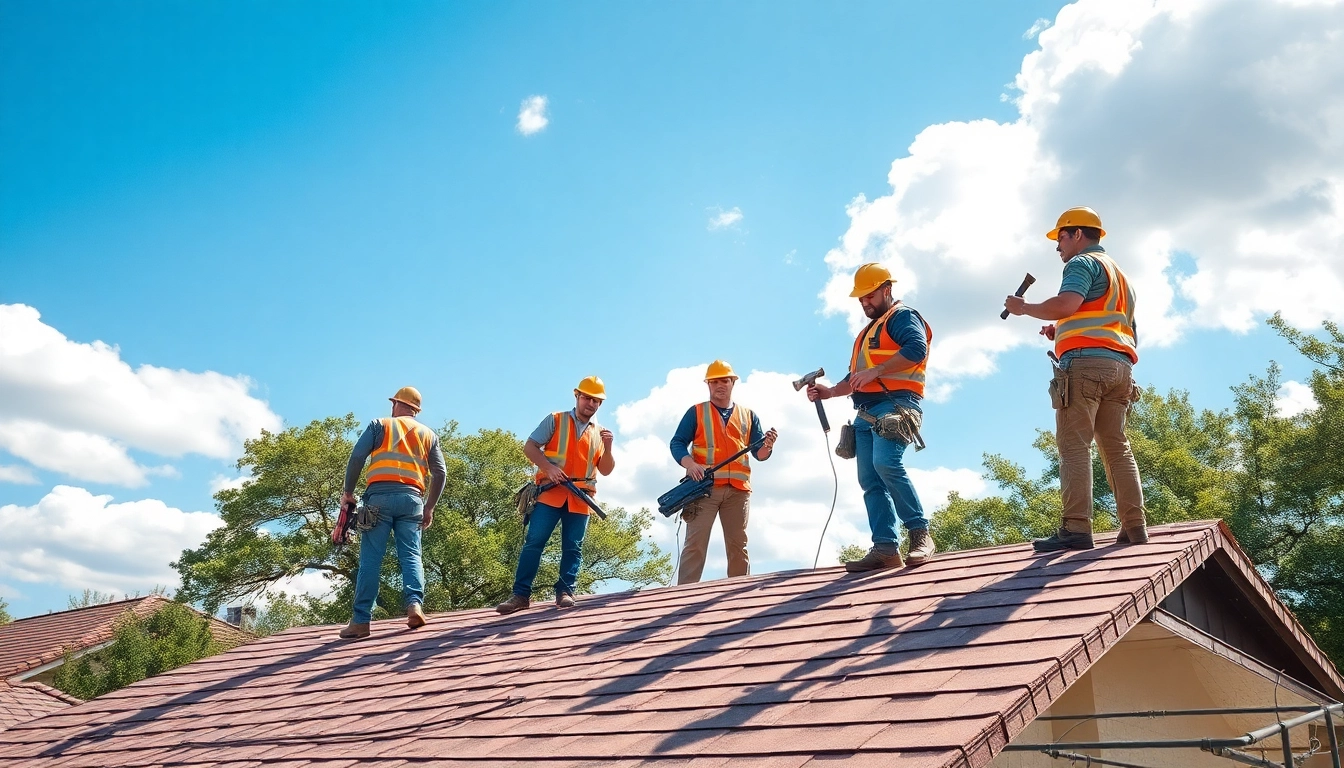Understanding the Importance of Licensed and Insured Roofers
When it comes to roofing services, homeowners and property managers in Austin have multiple options to choose from. However, the significance of hiring licensed and insured roofers Austin cannot be overstated. The safety and longevity of your property often depend on the quality of workmanship, materials used, and adherence to state regulations. Let’s delve deeper into why licensing and insurance are critical when selecting a roofing contractor.
What Licensing Means for Roofers
In Austin, roofing licenses ensure that contractors comply with local building codes and regulations. Licensing typically involves passing exams and fulfilling certain educational requirements. This process guarantees that a roofer possesses the essential knowledge in roofing practices, safety regulations, and industry standards. Licensed roofers are often required to continue their education, keeping up with advancements in roofing technology and material innovation.
Furthermore, working with licensed roofers can provide peace of mind to homeowners. It demonstrates a level of professionalism and a commitment to upholding the standards that govern the construction industry. In cases where issues arise during or after the installation, having a licensed contractor can make all the difference in terms of accountability and remediation.
The Significance of Insurance in Roofing
Insurance is paramount not just for the protection of the contractor but also for the safety of the homeowner. Licensed and insured roofers carry liability insurance that protects against damages that might occur during the roofing project. Should an accident happen—or damage occur to your property during work—you won’t be responsible for covering the costs. In Texas, while roofing licensing can be optional, insurance coverage is crucial for both homeowners and contractors alike.
Moreover, workers’ compensation insurance protects laborers on the job if they experience an injury while working on your roof. This aspect of insurance further underscores the importance of hiring insured professionals. Without this coverage, you may face substantial legal and financial repercussions if accidents involving uninsured workers arise.
Common Myths About Roofing Licenses
Despite the clear benefits, many misconceptions surround the concept of roofing licenses. One common myth is that all roofers are licensed. While some contractors do carry proper licenses, others may operate without them, suggesting that they prioritize cost-saving over quality assurance. Homeowners should not make assumptions about a contractor’s legitimacy based solely on their marketing material or word-of-mouth recommendations.
Another myth is that hiring a non-licensed contractor is always cheaper. While upfront costs may appear lower, non-licensed services often result in higher long-term expenses due to subpar work, leading to future repairs and replacements. Investing in a licensed contractor often pays off in the durability and lifespan of your roof, preventing unnecessary financial burdens down the line.
How to Find Qualified Roofers in Austin
Finding a competent, licensed, and insured roofer requires diligence and thorough research. However, the search can be manageable if you follow several key steps. Below, we outline a structured approach to help you locate qualified roofing professionals in the Austin area.
Researching Local Roofing Companies
Start by researching local roofing companies through various channels such as online searches, directories, and referrals from friends or family. Utilize platforms like Yelp and Google to obtain a list of businesses in your region. Use search terms related to “licensed and insured roofers Austin” to narrow down your options and focus on contractors who explicitly emphasize their qualifications.
Additionally, consider checking the websites of roofing companies that interest you. A professional online presence often indicates a long-term commitment to quality. Most reputable companies will provide details about their services, customer reviews, licensing, insurance, and warranty information.
Checking Licenses and Insurance
Once you’ve narrowed down your options, the next step is to verify that the roofers you’re considering are both licensed and insured. In Texas, you can typically check a contractor’s licensing status through the Texas Department of Licensing and Regulation (TDLR). This verification will allow you to confirm their credibility before making a hiring decision.
Ask the roofing companies directly to provide documentation of their insurance coverage. You should request a certificate of insurance that outlines both their liability coverage and workers’ compensation insurance. This document should include the company’s name, coverage period, and an active status—ensuring they’re currently insured.
Reading Customer Reviews and Testimonials
Customer reviews serve as a valuable resource when assessing potential roofers. Look for testimonials on platforms such as Google, Yelp, and the Better Business Bureau (BBB). These can provide insights into the contractors’ past performance, quality of work, level of customer service, and safety practices. Take note of how the company responds to negative feedback as this can reveal their commitment to customer satisfaction and issue resolution.
Additionally, consider asking the roofing company for references from previous clients. Contact these references to gain firsthand accounts of their experiences, which will aid in your decision-making process.
Common Services Offered by Licensed Roofers
Licensed and insured roofers in Austin typically offer a range of essential services that cater to diverse customer needs. Familiarizing yourself with these services can help ensure you choose a contractor capable of handling your specific roofing project.
Roof Installations and Replacements
One of the primary services provided by licensed roofers is roof installation and replacement. Whether you’re building a new home or your existing roof requires replacement due to age, storm damage, or other factors, hiring a professional ensures the job is done right. They will assess your property, recommend appropriate roofing materials, and complete the work per industry standards.
Furthermore, licensed roofers often provide a variety of roofing options, including asphalt shingles, metal roofing, tile, and flat roofing systems. They can help you evaluate the pros and cons of each material and select the best one to fit your aesthetic preferences, budget, and geographic location.
Roof Repairs and Maintenance
Roof repairs and routine maintenance are vital for prolonging the life of your roofing system. Licensed roofers are equipped to handle various repairs, including fixing leaks, replacing damaged shingles, and addressing structural issues. Regular maintenance, such as inspections and cleaning, can help identify potential problems before they escalate, saving you money and extending the lifespan of your roof.
Additionally, many roofing contractors offer maintenance plans tailored to individual needs, allowing you to establish a schedule for regular inspections and upkeep, thus ensuring that your roof remains in optimal condition throughout the years.
Emergency Roofing Services
Sometimes, roofing issues arise unexpectedly, such as storm damage or sudden leaks. Licensed roofers typically provide emergency services to address these urgent situations promptly. These contractors are trained to assess the damage quickly and implement temporary or permanent solutions, protecting your home from worsening conditions.
It’s crucial to communicate with your chosen contractor about their availability for emergency services to ensure you have the necessary support if a roofing crisis occurs.
Evaluating Roofing Quotes and Estimates
After conducting research and narrowing down your choices, the following step is to assess quotes and estimates from various roofing contractors. Understanding how to interpret these estimates can save you from unforeseen costs and ensure you get the best value for your investment.
Understanding the Cost Breakdown
When reviewing roofing estimates, it’s necessary to understand what each cost entails. Most quotes will include labor, materials, permits, and waste disposal fees. Pay attention to the quality of materials being used, as opting for cheaper materials may reduce long-term durability. Ensure that you compare estimates based on similar specifications to make accurate assessments.
Some contractors may charge additional fees for things like a warranty, cleanup, or site management. By asking for clarification on each line item in the estimate, you can make informed decisions about which services are truly necessary and beneficial.
Comparing Different Contractual Terms
In addition to understanding the cost breakdown, it’s also essential to compare the terms of each quote. This includes reviewing the timeline for the project, warranty coverage, payment schedules, and any other stipulations that the contractor may include. This way, you can ensure the terms align with your expectations and needs.
Be wary of any contracts that seem vague or lack clear timelines. A good contractor should be transparent about their processes and provide you with a well-defined scope of work.
Questions to Ask Roofers Before Hiring
Before finalizing your decision on which roofer to hire, it’s essential to ask some pivotal questions to avoid potential issues later on. Here are a few to consider:
- What is your licensing and insurance status?
- Can you provide references from previous clients?
- What is the estimated project timeline from start to finish?
- What materials will you use, and why do you recommend them?
- What warranties do you offer on labor and materials?
- How do you handle unexpected complications during the project?
By obtaining firm answers to these questions, you can make a more informed decision on which contractor best suits your needs and expectations.
Guarantees and Warranties: What to Expect
Warranties and guarantees are integral components of any roofing project. Understanding the different types offered can greatly affect your overall satisfaction as a homeowner and your investment.
Types of Warranties Offered by Roofers
Most roofing contractors provide two main types of warranties: a manufacturer’s warranty and a workmanship warranty. A manufacturer’s warranty directly relates to the roofing materials used, ensuring they will perform as promised for a specific period. For example, if materials like shingles or underlayment fail prematurely due to defects, the manufacturer is typically liable for replacement or repairs.
A workmanship warranty covers the labor aspects of the installation. Even if top-quality materials are used, poor installation can lead to significant problems. A good workmanship warranty assures you that if issues down the line arise due to installation mistakes, the contractor will take responsibility to fix them.
Why Warranty Coverage is Essential
Having warranty coverage is vital for your peace of mind. In roofing, the stakes are high; unforeseen failures can lead to significant financial consequences due to damages from leaks or structural issues. Knowing that your contractor stands behind their work and that you are protected by warranties can alleviate concerns. Always ensure you receive written documentation of warranties upon project completion and clarify how to invoke them should issues arise.
How Warranties Affect Your Investment
Warranties can significantly affect your investment in roofing. A contractor who provides comprehensive warranties not only shows confidence in their work but also values customer satisfaction. As you consider your options, prioritize roofing contractors who provide strong warranty coverage; doing so will likely lead to fewer headaches and maintain the integrity of your home long-term.



